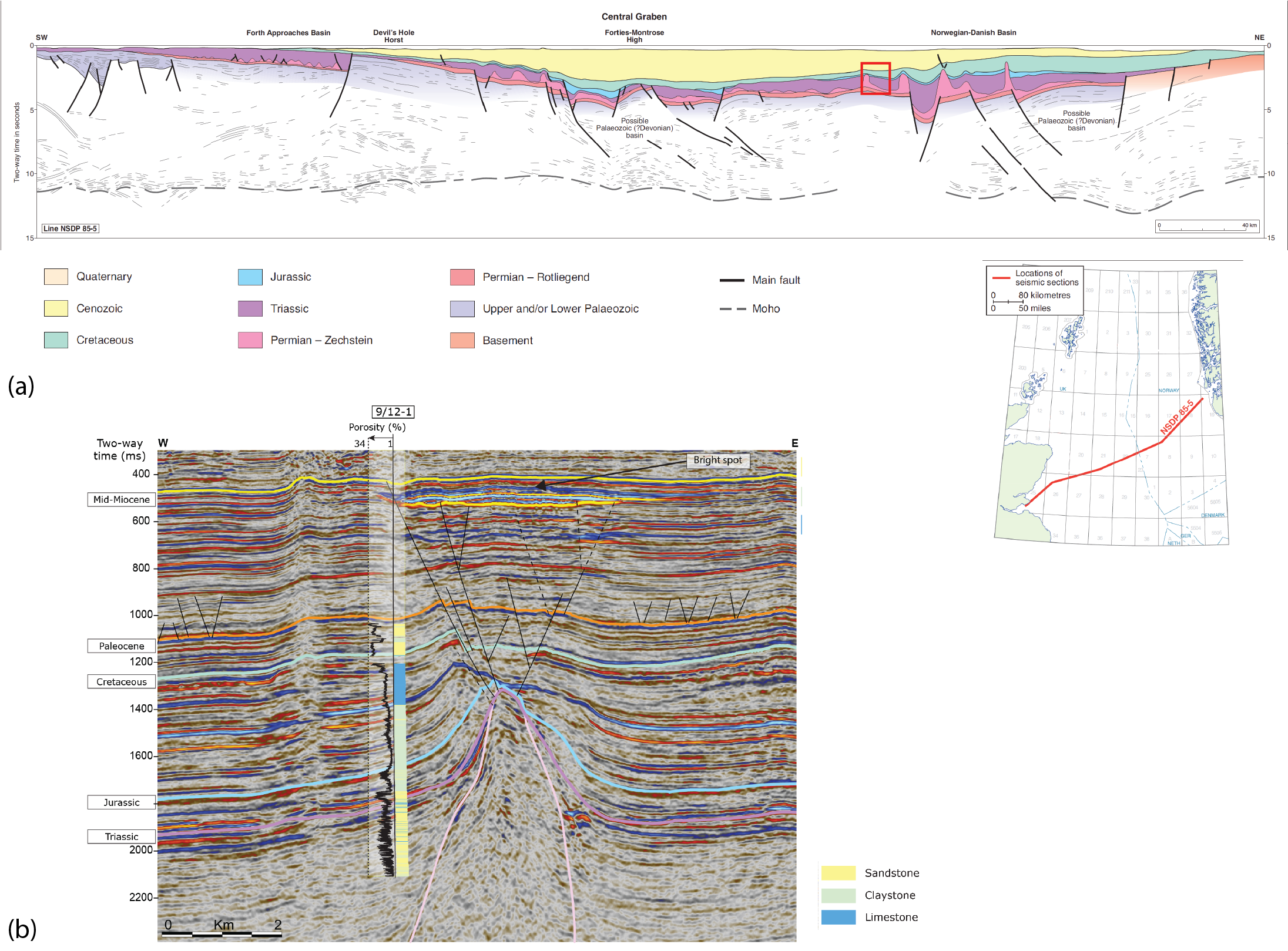In-person: Revitalizing under-explored salt basins for the energy transition: Geological storage in the Central North Sea

Figure caption: (a) Schematic cross-section across the central North Sea (modified from Zanella et al. (2003)) and (b) Representative example of a Zechstein salt-related structural trap with geological storage potential (seismic data from DISKOS)
The carbon capture and storage network group invites you to join us on this two day seminar with dinner. This conference aims to bring together experts, researchers, and industry professionals from around the globe to discuss the state of knowledge, share valuable insights, and foster collaborative discussions on geological storage in the unique context of the under-explored basins of the central North Sea. Don't miss out on this great event.
| Date | Time | Duration | Register by | Location |
| 19-20 November | 1130 | 2 Days | 13. November | TOR, NOD Entrance |
Located between Norway, Denmark and the United Kingdom, the central North Sea holds an optimal position for geological storage (Carbon Dioxide and Hydrogen) in northern Europe. Recently, the licensing of exploration and production licenses for carbon-capture storage have renewed the attention of the scientific and industrial community for the poorly explored basins of the central North Sea, notably the Norwegian-Danish basin. Yet, there are a lot of uncertainties about the sub-surface of these frontier basins.
The central North Sea encompasses several salt-bearing basins where salt tectonics has strongly controlled the stratigraphic architecture and the formation of structural closures. Previous studies suggested that these basins have the potential to store significant amounts of CO2. However, the storage capacity of these units, the integrity of sealing units above closures, and the risks associated with salt-related faults have yet to be characterized.
Programme
| DAY 1, 19th November | ||
| 11:30 | Registration and lunch | |
| 12:45 | Welcome | R.Bruhn. Equinor |
| 13:00 | Tectono-Stratigraphy Of The Norwegian-Danish Basin: Halokinetic Control On The Plays For CO2 Storage | S.Blondel, University of Oslo |
| 13:30 | The impact of halokenesis on Triassic sediment distribution and depositional environment, Norwegian Central North Sea | A.Hartley, University of Aberdeen |
| 14:00 | Geophysical surveys for offshore wind areas and underground storage on the Norwegian contiental shelf | L.Jensen, Sokkeldirektoratet |
| 14:30 | Break | |
| 15:00 | Hydrocarbon residue in a Danish chalk reservoir and its effects on CO2 injectivity | R.Stenshøj, GEUS |
| 15:30 | De-risking the integrity of a Paleogene–Neogene top seal complex using a integrated seismic geomorphological approach: The Nini CCS storage site, Danish North Sea | F.Smit, GEUS |
| 16:00 | Reactivity of the Luna field caprock with aqueous carbon dioxide | A.Busch, Herriott-Watt University |
| 16:30 | General aspects of fluid flow in the Norwegian-Danish Basin - drivers and triggers for the formation of various subsurface fluid migration features in the Danish North Sea | K.J.Andresen, University of Aarhus |
| 17:00 | Dicussion, end of day 1 | |
| 18:30 | Dinner at Sumo Hall Toll | |
| DAY 2, 20th November | ||
| 09:00 | H2 storage in salt caverns - Improved intra-salt structures characterization for safe development of new cavities | S.Delahaye, TOTAL Energies |
| 09:30 | Salt characterization in the Norwegian North Sea: what's the potential for the energy transition in the Zechstein Gp? | D.Blacone, University of Stavanger |
| 10:00 | Characterizing Salt for Hydrogen Storage, Aldbrough east coast UK | F.Sarikhany & S.Hoth, Equinor |
| 10:30 | Break | |
| 11:00 | Reactivity of glauconitic sandstones during diagenesis and CO2 experiments | R.Weibel, GEUS |
| 11:30 | The challenges and learnings from core flooding experiments on glauconitic sandstones, Project Greensand. | W.Al-Masri, GEUS |
| 12:00 | Geological and petrophysical characterization of the Nini West storage site seal, Danish North Sea. | N.Schovsbo, GEUS |
| 12:30 | Lunch | |
| 13:30 | Application of digital core analysis to Havstjerne carbon storage project, Southern North Sea, Norway | A.Fogden, Harbour Energy |
| 14:00 | Greenhouse gas emissions from marine decommissioned hydrocarbon wells: leakage detection, monitoring and mitigation strategies | C.Böttner, University of Aarhus |
| 14:30 | Geological storage of CO2 on the Horda Platform | N.Holden, University of Oslo |
| 15:00 | Break | |
| 15:30 | Salt diapirs and minibasins of the Hummer Fault Zone, offshore Southern Norway – structural evolution and CO2-storage perspectives | T.Hansen, University of Oslo |
| 16:00 | The 3D Stratigraphic Record of Salt Wall Evolution, Egersund Basin, Norwegian North Sea | U.Isikalp, University of Bergen |
| 16:30 | Rounding off, end of conference | |
Convenors
Simon Blondel (University of Oslo)
Rikke Bruhn (Equinor)
Sian Evans (University of Oslo)
Sabine Delahaye (TOTAL Energies)
Silvia Kassold (Aker BP)
Elisabeth Huebner (Harbour Energy)
Michael Bryld Wessel Fyhn (GEUS)
FORCE seminars have previously been fully booked with waiting lists so you are encouraged to sign up as soon as you know you will attend.
Participation fees:
FORCE members: NOK 2000,-
Non-members: NOK 4000,-
University/Students: NOK 500,-
Important information:
You can register as a FORCE member and pay "FORCE member" price if you are an employee of a member company.
All FORCE member companies are listed here.
Payment is made online by credit card or VIPPS. Please note that no refunds will be given after you have signed up.
If you for any reason cannot attend the workshop, you are welcome to send a representative, just inform the FORCE Secretariat as soon as there are changes.
If you need to cancel your registration, please use the confirmation e-mail you received when you signed up.
If the seminar/webinar is cancelled, your payment will be refunded.
For other questions, please contact the FORCE Secretariat
Norwegian Petroleum Directorate org.no: 870917732
Updated: 12/11/2024
